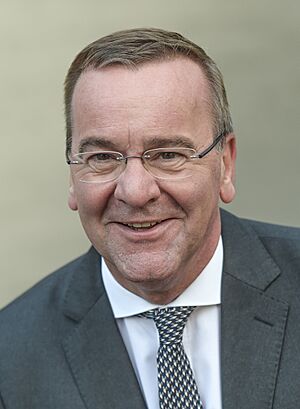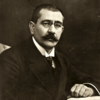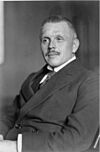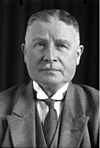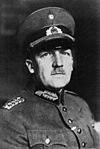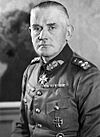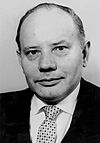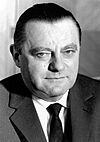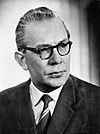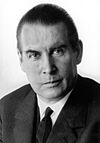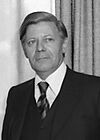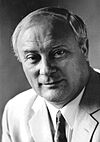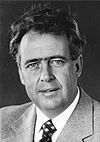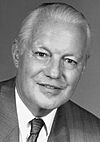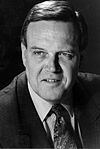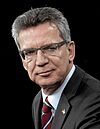List of German defence ministers facts for kids
Quick facts for kids Federal Minister of Defence |
|
|---|---|

|
|
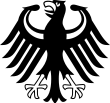
|
|
| Federal Ministry of Defence | |
| Reports to | The Federal Chancellor |
| Appointer | The President, upon advice of the Federal Chancellor |
| Formation | 13 February 1919 |
| First holder | Gustav Noske (Weimar Republic) Theodor Blank (Federal Republic of Germany) |
| Website | bmvg.de |
The Federal Minister of Defence (in German, Bundesminister der Verteidigung) is a very important person in the German government. They are in charge of the Federal Ministry of Defence. This ministry is like a big department that manages Germany's armed forces. The Minister is also a member of the Federal Cabinet, which is the main group of ministers who help the Chancellor run the country.
One of the most interesting things about this role is that the Federal Minister of Defence is the commander-in-chief of the German armed forces, called the Bundeswehr, during peacetime. This means they are the top boss for all military operations when there is no war. However, if Germany ever declares a "state of defence" (meaning the country is in a war or under attack), the Federal Chancellor takes over as the commander-in-chief. The highest-ranking military officer in the Bundeswehr, who works closely with the Minister, is called the Inspector General of the Bundeswehr.
Currently, the Federal Minister of Defence is Boris Pistorius. He started this job on January 19, 2023.
Contents
What Does the Minister of Defence Do?
The main job of the Federal Minister of Defence is to lead and manage the Bundeswehr. This includes making sure the soldiers, sailors, and air force personnel have what they need. It also involves planning for the country's safety and working with other countries on defence matters. They are responsible for the well-being of the troops and the overall readiness of Germany's military.
A Look Back: Defence Ministers Through History
The role of a defence minister has changed over time in Germany. Let's look at some of the people who held this important position.
Early Ministers of Defence (1919–1935)
After World War I, Germany created the role of Minister of Defence. These early ministers helped shape the country's military during a challenging time.
| No. | Portrait | Minister of Defence | Took office | Left office | Time in office | Party | Cabinet |
|---|---|---|---|---|---|---|---|
| 1 | Gustav Noske (1868–1946) |
13 February 1919 | 22 March 1920 | 1 year, 38 days | SPD | Scheidemann Bauer |
|
| 2 | Otto Gessler (1875–1955) |
27 March 1920 | 19 January 1928 | 7 years, 298 days | DDP | Müller I Fehrenbach Wirth I−II Cuno Stresemann I−II Marx I−II Luther I−II Marx III−IV |
|
| 3 | Wilhelm Groener (1867–1939) |
19 January 1928 | 30 May 1932 | 4 years, 132 days | Independent | Marx IV Müller II Brüning I−II |
|
| 4 | Kurt von Schleicher (1882–1934) |
1 June 1932 | 28 January 1933 | 243 days | Independent | Papen Schleicher |
|
| 5 | Werner von Blomberg (1878–1946) |
28 January 1933 | 21 May 1935 | 2 years, 113 days | Independent | Schleicher Hitler |
Ministers of Defence Since 1955
After World War II, West Germany (which later became part of today's unified Germany) re-established its armed forces and the role of the Federal Minister of Defence in 1955. These ministers have been crucial in building and maintaining the modern Bundeswehr as a defensive force within NATO.
| No. | Portrait | Name | Took office | Left office | Time in office | Party | Cabinet |
|---|---|---|---|---|---|---|---|
| 1 | Theodor Blank (1905–1972) |
7 June 1955 | 16 October 1956 | 1 year, 131 days | CDU | Adenauer II | |
| 2 | Franz Josef Strauß (1915–1988) |
16 October 1956 | 9 January 1963 | 6 years, 85 days | CSU | Adenauer II–V | |
| 3 | Kai-Uwe von Hassel (1913–1997) |
9 January 1963 | 1 December 1966 | 3 years, 326 days | CDU | Erhard I–II | |
| 4 | Gerhard Schröder (1910–1989) |
1 December 1966 | 21 October 1969 | 2 years, 324 days | CDU | Kiesinger I | |
| 5 | Helmut Schmidt (1918–2015) |
22 October 1969 | 7 July 1972 | 2 years, 259 days | SPD | Brandt I | |
| 6 | Georg Leber (1920–2012) |
7 July 1972 | 16 February 1978 | 5 years, 224 days | SPD | Brandt I–II Schmidt I–II |
|
| 7 | Hans Apel (1932–2011) |
17 February 1978 | 1 October 1982 | 4 years, 226 days | SPD | Schmidt II–III | |
| 8 | Manfred Wörner (1934–1994) |
4 October 1982 | 18 May 1988 | 5 years, 227 days | CDU | Kohl I–II–III | |
| 9 | Rupert Scholz (born 1937) |
18 May 1988 | 21 April 1989 | 338 days | CDU | Kohl III | |
| 10 | Gerhard Stoltenberg (1928–2001) |
21 April 1989 | 31 March 1992 | 2 years, 345 days | CDU | Kohl III–IV | |
| 11 | Volker Rühe (born 1942) |
1 April 1992 | 26 October 1998 | 6 years, 188 days | CDU | Kohl IV–V | |
| 12 | Rudolf Scharping (born 1947) |
27 October 1998 | 19 July 2002 | 3 years, 265 days | SPD | Schröder I | |
| 13 | Peter Struck (1943–2012) |
19 July 2002 | 22 November 2005 | 3 years, 126 days | SPD | Schröder II | |
| 14 | Franz Josef Jung (born 1949) |
22 November 2005 | 28 October 2009 | 3 years, 340 days | CDU | Merkel I | |
| 15 | Karl-Theodor zu Guttenberg (born 1971) |
28 October 2009 | 3 March 2011 | 1 year, 126 days | CSU | Merkel II | |
| 16 | Thomas de Maizière (born 1954) |
3 March 2011 | 17 December 2013 | 2 years, 289 days | CDU | Merkel II | |
| 17 | Ursula von der Leyen (born 1958) |
17 December 2013 | 17 July 2019 | 5 years, 212 days | CDU | Merkel III–IV | |
| 18 | Annegret Kramp-Karrenbauer (born 1962) |
17 July 2019 | 8 December 2021 | 2 years, 144 days | CDU | Merkel IV | |
| 19 | Christine Lambrecht (born 1965) |
8 December 2021 | 19 January 2023 | 1 year, 42 days | SPD | Scholz | |
| 20 | Boris Pistorius (born 1960) |
19 January 2023 | Incumbent | 3 years, 38 days | SPD | Scholz |
 | Selma Burke |
 | Pauline Powell Burns |
 | Frederick J. Brown |
 | Robert Blackburn |


